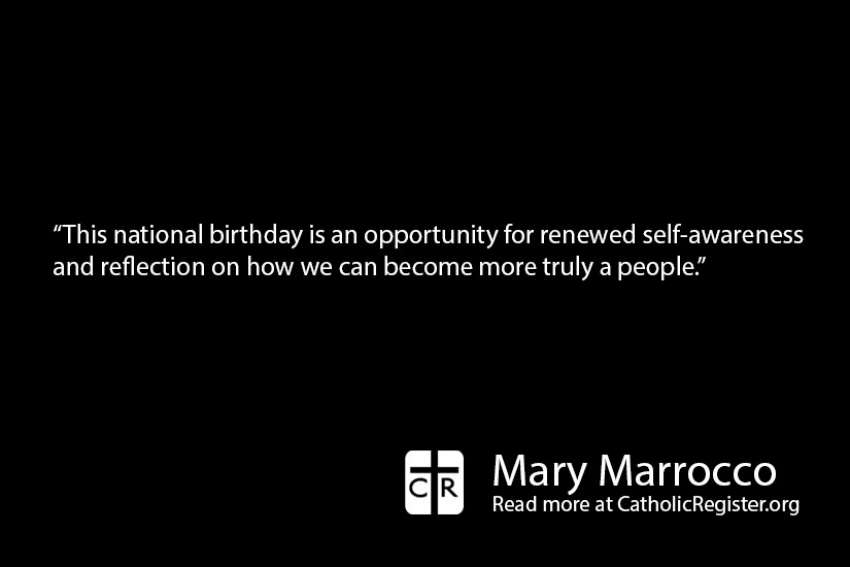Discovering we’re part of a people is an essential ingredient of being human. The discovery may come in a negative or shocking way, as in the case of the “Elephant Man.” John Merrick’s experience of being outcast and excluded from the people, on account of their response to his physical deformities, revealed he was also part of them. For Adin and Brian, joining themselves to each other and to another nation helped them reflect on how they were formed by their distinct peoples and what this meant for them.
One way or another, we come to see that we’re part of a people. Then we can ask: How am I a part of this people? How does this change me?
This summer, Canada turns renewed attention to its nationhood. A relatively young nation, incorporated of those from different nations, Canada has wrestled with the question: Who are we as a people?
Being a people, or nation, is a social and political reality. Nations require borders — created mostly as a defence against each other, to keep “our” people from being harmed by “your” people. In this sense, they’re a response to the fundamental experience of sin that divides, pitting nation against nation, man against woman, child against parent, humanity against God. Relationship is hard for us partly because we know its risks, the terror of being torn from the other or treated violently by the other, who — as we know deep down — really should be with us.
Being a people is a theological reality, too. Christian tradition has long reflected on what it means to be a people. Perhaps the Church can offer some assistance in helping our nation understand its true purpose, beyond mere self-preservation.
In making us part of a people, God gives a response to the ancient question of “the one and the many”: Is life an experience of radical separateness — as it often feels — or radical unity — as it can seem? The answer is in the tension between them, as Brian and Adin learned. Distinction reveals relationship; I can’t be truly in relationship unless I know myself as distinct from the other.
Distinctions within humanity aren’t intended to protect against the other, but to establish communion. God makes it so by designing us as part of a people, not as independent units.
Being a people actually helps us understand distinction. We suppress or glorify distinction when we wish to control, exclude or escape. We discover distinction as we learn to be in relationship. This is the reality of the Trinity, who leads us into the mystery of diversity and unity.
The Second Vatican Council reflected on the cherished image of the Church as People of God. The Synod of Bishops regularly address their messages to the “People of God.” The Catechism of the Catholic Church gives attention to this important image. What’s it like to be the People of God?
It has its own special characteristics — not to exclude others, but for the sake of others. Its law is love, its mission is to be salt and light for the world, its destiny is the Kingdom of God already begun on Earth (CCC No. 782).
It’s a chosen people, brought together by God. Belonging is not by birth or birthplace, but by baptism. It means being obedient to God, not as slaves, but out of love. This loving obedience is our true source of belonging. It’s not that members think, or eat, look or talk the same. It’s that they belong to Christ. If we forget ourselves as made in God’s image, can we discover our unity as a people?
Belonging to the People of God means being free, as children of God. Yet it also means being shaped by this relationship with God. God’s people are led through the wilderness, sculpted by the shared experience of being lost and vulnerable. They’re shaped also by the land they walk on and the way they dwell on the Earth. The People of God is formed not for itself, but so that all humanity can be wedded to God, for we are all consubstantial, one to another.
As we celebrate Canada’s 150th birthday, we aren’t celebrating “us against others,” people set against people; this is the way hell works, not the way love works. This national birthday is an opportunity for renewed self-awareness and reflection on how we can become more truly a people.
(Marrocco can be reached at marrocco7@sympatico.ca)


